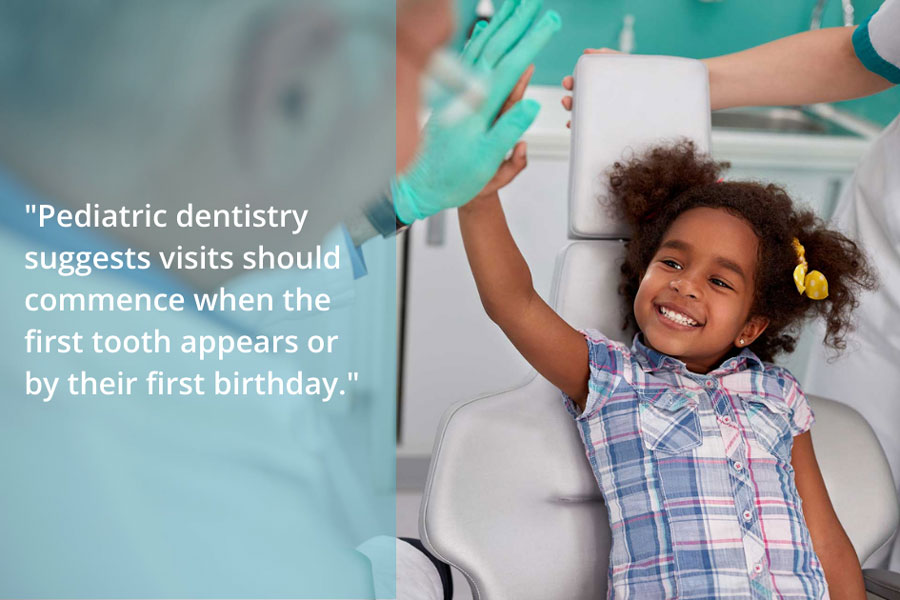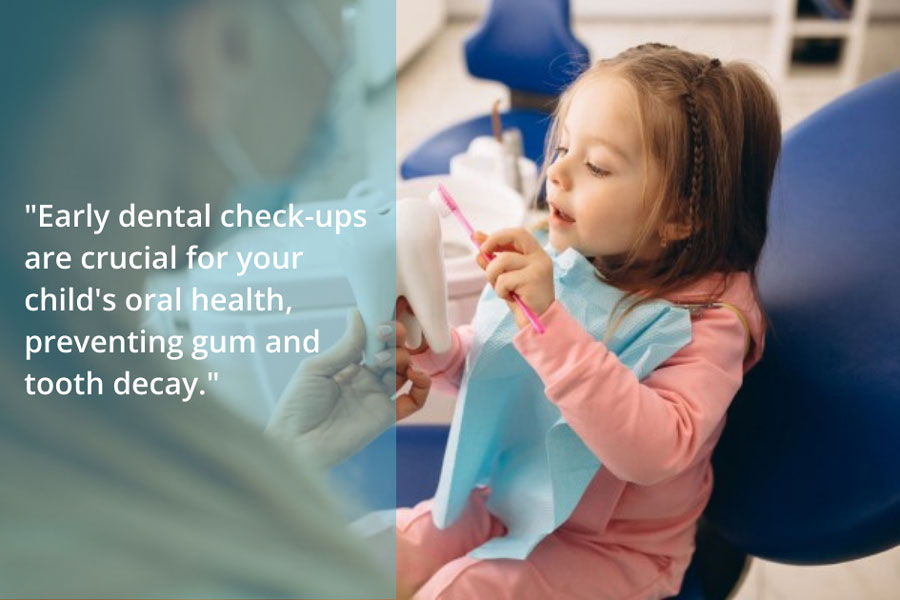Many parents remember most of the significant milestones in their child’s life but often forget about scheduling their initial dental visit. So, when is the appropriate time to book your child’s initial meeting with the dentist? It isn’t as confusing as it may appear. However, before we reveal the ideal age, it’s essential to understand why starting early is so crucial.
Understanding the First Dental Visit
We’re here to guide you through understanding your child’s initial dental visit, an event that generally happens by their initial year or as soon as their initial tooth emerges. This visit serves a significant role in preventing tooth decay, a prevalent but avoidable problem with baby teeth.
The dental professional checks and cleans your child’s teeth, providing you with advice on proper oral care. This early exposure to dental health establishes a positive atmosphere for your child, cultivating a good relationship with oral hygiene.
Adherence to these suggested visits can guarantee cavity prevention and bolster overall oral health. Don’t forget, our baby teeth might start appearing as early as six months, so there’s no such thing as being too early when considering these important steps in your child’s life.
Importance of Early Dental Check-Ups
We can’t stress enough how crucial early dental check-ups are for your child’s oral health. Pediatric dentistry suggests these visits should commence when your child’s initial tooth makes its appearance or by their inaugural birthday at the latest.
These check-ups serve an essential function in preventing gum and tooth decay, which could start alarmingly early, sometimes as soon as six months!
Apart from ensuring those small teeth stay healthy, these visits can also instill good oral hygiene habits. Regular dental check-ups evolve into a positive, familiar experience, charting the course for a lifetime of healthy smiles.
Identifying the Ideal First Visit Age
The American Academy of Pediatric Dentistry recommends that your child should visit the dentist either when they turn one or when their initial tooth appears, whichever is earlier. This significant step can aid in maintaining your child’s oral health and warding off tooth decay.
Consider these critical reasons:
- Infant teeth typically make their appearance around the age of six months. Scheduling dental appointments from a young age ensures these teeth grow properly.
- Research indicates that delaying a child’s initial visit to the dentist can heighten the risk of developing cavities.
- Starting dental visits at a young age lays the foundation for a lifetime of good oral health practices.
- During these early appointments, parents can acquire the correct methods for infant and toddler dental care, which can result in improved dental health in later years.
Preparing for Your Child’s Visit

We’ll provide some useful strategies to ensure smoother appointments and educate on establishing early expectations for a hassle-free experience.
The goal is to transform that inaugural dentist appointment into an enjoyable adventure for your child!
Setting Expectations Early
Even before your child’s initial tooth emerges, it’s beneficial to establish expectations for their inaugural dental visit to foster a positive outlook on oral health care. Presenting your little one with the idea of a dentist may appear challenging, but it’s a crucial step in preparing them for their debut appointment.
- Utilize books or videos designed for children to illustrate the role of pediatric dentists.
- Have a conversation about the significance of dental visits in preserving a radiant smile.
- Make them comfortable with dental instruments such as the toothbrush and mirror.
- Set up a ‘make-believe’ examination at home to demonstrate that it’s not intimidating.
Tips for Smooth Visits
To make your child’s initial dental visit go smoothly, it’s crucial to ready them in advance – speak positively about the forthcoming appointment and establish a clear picture of what they can expect. Advocate for good oral hygiene by teaching them the correct way to brush and floss. This not only prepares them for the dentist but also boosts their oral health.
Take along a comfort object they love to help alleviate any nerves. Arriving ahead of time can also assist them in becoming familiar with their new surroundings. Most crucially, never shy away from discussing your child’s needs or concerns with the dental team. Always recall that we’re all working toward the same goal: your child’s oral health.
What to Expect During the Visit
On your child’s initial visit to the dentist, expect a gentle examination and cleaning of your little one’s teeth, which initiates a journey toward lifelong dental health. Your baby’s introductory dental appointment is a crucial step for maintaining optimal oral hygiene.
Here’s an overview of what’ll happen:
- The hygienist will meticulously clean your child’s teeth, ensuring a healthy beginning.
- They’ll teach you the correct methods for maintaining your little one’s dental cleanliness at home.
- The dentist will examine for any signs of tooth decay or other potential dental problems. No need for concern, this is a normal part of the procedure.
- Finally, you’ll receive recommendations for dental care products that are suitable for your child’s needs.
Preventive Measures for Tooth Decay in Children
Early dental appointments are crucial, coupled with transforming the dentist’s office into a fun environment. Plus, we’ll suggest some simple habits to shield your child’s delightful grin from tooth decay.
Importance of Early Visits
Comprehending the significance of early dental appointments can guide your child toward superior oral health. These proactive steps aid in halting tooth decay as soon as a tooth materializes. These appointments are about more than just inspecting for cavities; they also focus on fostering good oral hygiene habits and cultivating a positive rapport with the dentist.
Here are four crucial reasons why early dental appointments are essential:
- They aid in preventing tooth decay, which can commence as soon as a tooth materializes.
- The American Academy of Pediatric Dentistry recommends these appointments either by the child’s initial birthday or tooth emergence.
- Postponing the initial appointment heightens the risk of dental complications.
- Consistent checkups identify and tackle potential issues at an early stage.
Child-Friendly Dental Practices
Promoting good oral health in children requires a focus on child-friendly dental practices that ensure preventive measures against tooth decay.
A pivotal role in these practices is played by pediatric dentists who provide education to families on correct dental care and nutrition. They also offer preventive actions such as fluoride treatments and sealants to guard children’s teeth from decay.
Initial dental visits should ideally be scheduled when your child’s initial tooth appears or by their first birthday. These visits establish beneficial oral hygiene habits and allow dentists to detect and deal with dental issues at an early stage.
The significance of these child-friendly dental practices should never be underestimated as they lay the foundation for lifelong dental health.
Establishing Healthy Oral Habits
Early dental examinations serve as a robust guard against tooth decay, enabling us to cultivate healthy oral habits in our children and avert possible dental complications. That initial appointment is an essential move towards protecting their radiant smiles. It’s more than merely taking your child to the dentist; it’s about guiding them towards enduring dental health.
To nurture these habits, contemplate these measures:
- Initiate Early: Plan the inaugural visit around their first birthday or when their inaugural tooth emerges.
- Frequent Check-ups: Initial visits assist in identifying potential dental problems. Stay consistent with scheduled appointments.
- Appropriate Oral Hygiene: Instruct them to brush twice a day and floss daily.
- Monitor Diet: Uphold a balanced diet that’s low on sugary snacks.
Addressing Common Dental Fears

Dealing with common dental fears such as the fear of pain, needles, drills, or strange sounds is an essential aspect of your child’s initial visit to the dentist. Pediatric dentists specialize in crafting a kid-friendly setting that can reduce anxiety. They employ methods such as desensitization, positive reinforcement, and distraction to make your little one comfortable.
It’s crucial to note that dental anxiety affects up to 20% of children. This can originate from previous negative encounters, fear of the unknown, or even anxiety from parents. However, by tackling these fears early on and sustaining this supportive atmosphere, we can assist your child in fostering a positive perspective towards dental care, thereby paving the way for a lifetime of good oral hygiene practices.
Continuing Dental Care at Home
Emphasizing the necessity of ongoing dental care at home can’t be overstated. Parents play a pivotal role in educating their children about appropriate oral hygiene. This is a key part of preserving their dental health and warding off tooth decay.
Here are four initiatives to help you begin:
- Show them and make sure they practice the correct way to brush their teeth. It’s best to use a soft-bristled toothbrush and fluoride toothpaste, ensuring brushing is done twice a day.
- Limit the consumption of sweets and sugary beverages. These aren’t only detrimental to their overall health, but also to their teeth.
- Flossing is crucial! It assists in cleaning the parts of the mouth that a toothbrush may not be able to access.
- Make it a habit to schedule dental appointments for early identification of any potential problems. The earlier these are identified, the more effective the treatment can be!
Conclusion
We’ve discovered that the optimal moment for our child’s initial dental check-up is either when that inaugural tooth appears or around their initial birthday. An early start aids in warding off tooth decay and lays the groundwork for effective oral hygiene.
Remember, the goal is to create a positive experience and establish excellent dental routines. Let’s keep those baby teeth shiny and kick off the journey towards lifelong dental health! Don’t hesitate to reach out and schedule your child’s dental visit today!